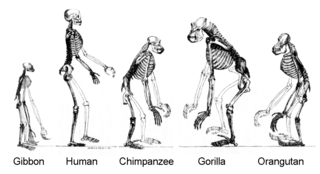In the popular coverage of science, the question is sometimes raised, “Are humans still evolving?” Some high-profile science figures such as Sir David Attenborough, and even some biologists, such as Professor Steve Jones of University College London, have said that, “evolution is over” for humans, at least in the developed West.

I am an ardent admirer of David Attenborough's work, but on this point, I must object. Humans are most definitely evolving, even if we’re not sure exactly how at this particular time.
A difference in terms
The disagreement appears to stem from confusing evolution with natural selection. They are not the same thing. Evolution is the gradual genetic change of a species over time due to unequal reproduction among members. Natural selection, on the other hand, is the phenomenon that rewards certain advantageous traits and punishes others through better or worse survival or reproduction. Natural selection is a frequent cause of evolution, but evolution refers only to the change itself.
Other forces of evolution
While natural selection is the most recognizable engine of evolution, it is not the only one. Many other factors can lead to a genetic change in a species that have nothing to do with differential survival or reproductive success. Sometimes changes can happen purely by chance.
For example, if a forest fire rages and quickly kills almost all of a certain kind of monkey, the few remaining monkeys will become the sole contributors to the future gene pool of the species. Let’s say that, by chance, most of the few monkeys that survived happened to be shorter than average. In this case, the monkey species will then be shorter than it was before. If we were to find these monkeys later as fossils, we’d see the evolution of the species toward a shorter stature, but we wouldn’t necessarily know whether it was due to natural selection or just random chance.
The effect of random events on evolution is called genetic drift. There are many ways in which random events can alter the evolutionary future of a species and most of them involve a population contracting to a small number. In any species, a few members cannot perfectly represent the full complexity of the full gene pool. Population bottlenecks will inevitably skew things in various random ways.
There are other forces behind evolution as well. Mutation is a common one, and so is migration and exchange of genetics between normally separate populations living in distinct climates. While natural selection gets most of the attention, mutation, drift, and migration also contribute to how species change over time.
The claim that humans are no longer evolving
Some claim that humans are no longer evolving because the force of natural selection has been removed from the issue of who leaves offspring (and how many) and who doesn’t. The reasoning is that, because of advances in science, almost everyone can live to have children, regardless of genetic medical conditions and other strengths and weaknesses they may have.
Similarly, because we’re not pitted against each other for precious resources, almost no one starves to death (in developed countries), and all are provided for, at least minimally. Humans are not hunted by any other species, nor are they being squeezed out of their habitat.

Because of all of this, nowadays, almost everyone that is born will live to reproductive age. The rare deaths before that are most often due to accidents and even the natural deaths are generally due to infectious disease or sporadic illness or cancers that are not caused by a simple genetic weakness.
Furthermore, non-health-related genetic factors don’t seem to affect reproductive rates either. Among early humans, one’s ability to reproduce was dependent not only on health and vigor, but also things like speed, strength, hand-eye coordination, dexterity, intelligence, skill, ability to focus, emotional stability, connection to others, popularity, and leadership qualities. Even physical attraction probably made a big difference. A whole host of physical, mental, and emotional traits were important factors in whether or not a given individual would survive, win a mate, and produce successful children.
None of that seems to matter anymore. To put it crudely, the slow, sickly, unstable, homely, and cognitively challenged seem to reproduce just as well as the healthy, strong, attractive, and smart ones. For humans, the determination of “fitness,” the key measure of natural selection, is no longer valid. For this reason, some have concluded that humans are no longer evolving.
But we ARE evolving!
While the reasoning above may seem sound, it lacks conclusive data. I’ve yet to see a study that shows that sickly individuals reproduce as well as the healthy, and there are plenty of reasons to believe that they might not. Measures of attractiveness are subjective anyway and tend to change over time. Also, studies measuring the reproductive rate of different intelligence cohorts of our society tend to rely on unreliable measures that are tinged with racism. I would argue that the jury is still out on whether any of these factors currently affect reproductive success.
Much more important, however, is that, even if 100% accurate, the reasoning above would only argue that natural selection is no longer at work. A population can continue to evolve even when selective pressures are removed because selection is not the only force in evolution.
The only way it could be true that the human species is no longer evolving is if rates of successful reproduction were spread evenly and randomly among all possible segments of the population. We know that this is not the case.
First of all, birthrates are much lower in wealthy countries than they are in developing ones and are continuing to fall. The population in Japan is currently shrinking, and so would the population of several Western European countries were it not for immigration. This means that the contribution of the Japanese, Italians, and Spanish to the future gene pool of the species is getting smaller and smaller. That’s evolution.
Secondly, within a given country, whether developed or underdeveloped, some people reproduce more than others and this is not purely random. Those of higher socioeconomic status have better access to birth control resources, tend to choose smaller family size, and are also more likely to forgo reproduction altogether. Therefore, those of lower socioeconomic status tend to leave more offspring. That’s evolution, too.
Besides economics, things like religion, education level, career advancement, ethnic and family background, and even political beliefs all affect reproductive rates. In the West, these many factors influencing reproduction do not break down evenly across the various racial groups because of the long history of racial oppression and ongoing social and political inequality.
This means that, in North America and Western Europe, people of African and Latino origin tend to have more children than nonimmigrant Caucasians, on average, but even this trend is not uniform and there are strong regional differences. In Asia, there are wide differences as well. Large families are completely unheard of in China, Japan, India, and most of Southeast Asia, while countries like Pakistan, Iran, and Afghanistan have sky-high birthrates.
The point is that evolution occurs in a species whenever there are differences in reproductive success. That is certainly the case with humans right now. It’s true that differential survival is not a major phenomenon, at least not in the developed West, but differential reproduction certainly is. It doesn’t matter that the differences are due to conscious reproductive choices. it’s still unequal reproductive success. That’s evolution.
Humans are evolving. In what way we are evolving is harder to answer, and is constantly changing anyway.
The only constant in life is change.




